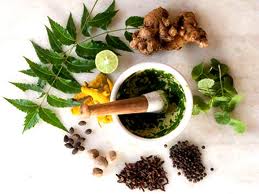
Ayurveda is a 5000 year-old system of science and philosophy originating in the Vedic culture of India. It was devised as a system of holistic, natural healing to provide balance between the body, mind, spirit and the environment. Its purpose is to heal and maintain the quality and longevity of life. Ayurveda offers a deep understanding of the uniqueness of each individual, and how to balance an individual’s constitution based on the five elements.
Ayurveda sees the whole person as a unit. It is considered a “living science” because it incorporates modern developments and techniques along with ancient wisdom. Ayurveda targets the root cause of constitutional imbalance, seeks to uproot it, and applies rejuvenative principles to restore constitutional balance.
Ayurveda also states that the purpose of life is to know and realize the Creator, both within and without. It includes the belief that the root cause of imbalance is our sense of separation from our original consciousness and from nature.
According to Ayurveda, everything in the Universe is comprised of the five elements: air, water, fire, earth and space. These elements combine to form the three metabolic types, or doshas. When a person is balanced according to how their body type operates optimally, a person’s prevailing dosha will manifest itself in certain positive qualities or traits in a person. When unbalanced, those traits will be skewed or corrupted. According to Ayurveda, vital health is possible when you eat, live and treat your body in ways that in harmony with your unique constitutional, or doshic needs.
The three doshas are as follows:
Vata dosha represents the combination of space and air. A person with this dosha is thin, quick, energetic and optimistic when balanced, and anxious, forgetful and restless when out of balance. Individuals with this dosha are prone to physical qualities of dry skin and constipation.
Kapha dosha represents the combination of water and earth. This dosha is said to reflect the traits of resilience, strength and growth. Individuals with this dosha are typically muscular, steady, calm, thoughtful when in balance, and lethargic and complacent when out of balance. Individuals with this dosha are prone to physical qualities of being prone to excessive mucous and are potentially slow-moving or carrying extra weight.
Pitta dosha represents the combination of fire and water. This dosha is said to reflect the traits of passion, intelligence and courageousness. Individuals with this dosha are typically creative, ambitious and charismatic when in balance, and controlling, angry and critical when out of balance. Individuals with this dosha are prone to over-heated imbalances such as redness in the skin.
We are all born with a certain balance of the doshas, typically with one or two being dominant. Over time, we typically will go out of balance in one, two or all three of our doshas, and one goal of Ayurveda is to restore us to our original state of balance, whether that is as a Kapha, a Pitta, a Vata, or some combination of these three.
According to Ayurveda, the source of imbalance can be traced to incorrect eating habits, inefficient digestion and a lifestyle of unrelenting stress. My role as an Ayurvedic Practitioner is to help you to identify your dosha imbalances ~ and to teach you ways to regain your balance through the use of foods, herbs and daily practices fitting for your unique body constitution.
Ayurveda for Relationships
By identifying your or your partner’s dosha, and whether it is balanced or unbalanced, you can gain insight into what makes you tick, how you’ll relate to each other, and what “hot buttons” you need to avoid in order to have a loving and amicable relationship.
There are no imperfect or wrong matches in Ayurveda. By knowing your dosha type, you can discover ways to align to your natural rhythms, and to feel more balanced in your life. This can help build a healthier foundation for your relationship. With Ayurveda, you can also learn strategies for:
> Increasing the connection and affection with your partner by understanding your individual communication style
> Easing tension and anger by knowing each other’s weaknesses and triggers, and how to work with them
> Intensifying your love by learning how to harmonize your behavior
With a comprehensive Ayurvedic consultation, I’ll help you discover your dosha type and show you how to apply the nuances of balance for your dosha in order to harmonize your relationship, as well as improve your vitality and mood.
What Does an Ayurvedic Consultation Involve?
An initial assessment will include detailed questions about your constitution, diet and lifestyle. This may include questions about your the appearance of your tongue, nails, eyes and skin. I’ll also ask you questions about your diet, exercise and sleep habits. This will allow me to determine your constitution.
From there, I can create individualized recommendations for restoring balance to your doshas. Please note that I am not a licensed physician nor can I make suggestions about your current medications. I practice Ayurveda under CA SB577.

